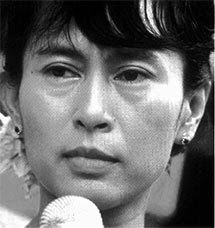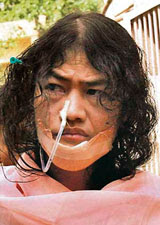Anti-AFSPA protestors demand "Free Burma and Aung San Suu Kyi"
The ongoing solidarity fast in support of Irom Chanu Sharmila's struggle to repeal Armed Forces Special Powers Act (AFSPA) has broadened its agenda congruent with the declarations of past New Delhi (2005) and Lahore (2006) Peaceful South Asia Conventions – demand for a Free Burma and Free Aung San Suu Kyi.

Aung San Suu Kyi is imprisoned under the 1975 State Protection Act in Myanmar (Burma), which grants the government the power to imprison persons for up to five years without a trial. She has been intermittently under arrest of one kind or the other since 1990.
Irom Chanu Sharmila – the iron lady of Manipur in India , has been on a continuous fast since 2000 demanding repeal of AFSPA.
.jpg)
Despite the restrictions of house arrest, Aung San Suu Kyi continued to campaign for democracy, similar to Irom Sharmila, who has been under confinement and steadfastly protesting against AFSPA since past 7 years now.
Filmmaker Mahesh Bhatt has endorsed this fast along with hundreds of other organizations and individuals globally.
Countless people are fasting for five days (13-17 September) in Keishampat junction, Imphal, Manipur, to lobby more support to the anti-AFSPA campaign.
Significant others from different countries in the world have signed up on www.ashaparivar.org to fast for varying durations from September 13 to support the campaign.
The launch of this five days solidarity fast came two days after the 'Apunba Lup' observed Anti-army Act Day on September 11 here to mark the completion of five decades of the act in the North-East. The present UPA Government had constituted the Justice Jeevan Reddy Commission in 2004 to review AFSPA in response to an intensive campaign led by 'Apunba Lup'.
By 1988, Burma was burgeoning with pro-democracy movement, fueled by the energy and idealism among the country's young people. There were demonstrations against the repressive, one-party socialist government. Aung San Suu Kyi was drawn into the pro-democracy movement, which was snuffed out by State Law and Order Restoration Council (SLORC), which seized power on September 18, 1988. Thousands of pro-democracy advocates were killed.
Next came a general election in 1990, which political parties were allowed to contest. Aung San Suu Kyi, who was leading the National League for Democracy (NLD), won a landslide victory, with 80 per cent support. SLORC leaders refused to accept the election results putting the elected pro-democracy leaders under house arrest, including Aung San Suu Kyi.
Despite the restrictions of house arrest, Aung San Suu Kyi continues to campaign for democracy. She was awarded the Nobel Prize for peace in 1991.
The protests of Sharmila and Aung San Suu Kyi represent the most ideal form of peaceful struggles for a democratic demand.
Their victory is essential for the strengthening of democracy in South Asia and for the respect for human rights around the world.
Their victory will determine whether the voice of common citizen will be heard or the state will continue to trample over people's rights with anti-people laws and policies.
The ongoing solidarity fast in support of Irom Chanu Sharmila's struggle to repeal Armed Forces Special Powers Act (AFSPA) has broadened its agenda congruent with the declarations of past New Delhi (2005) and Lahore (2006) Peaceful South Asia Conventions – demand for a Free Burma and Free Aung San Suu Kyi.

Aung San Suu Kyi is imprisoned under the 1975 State Protection Act in Myanmar (Burma), which grants the government the power to imprison persons for up to five years without a trial. She has been intermittently under arrest of one kind or the other since 1990.
Irom Chanu Sharmila – the iron lady of Manipur in India , has been on a continuous fast since 2000 demanding repeal of AFSPA.
.jpg)
Despite the restrictions of house arrest, Aung San Suu Kyi continued to campaign for democracy, similar to Irom Sharmila, who has been under confinement and steadfastly protesting against AFSPA since past 7 years now.
Filmmaker Mahesh Bhatt has endorsed this fast along with hundreds of other organizations and individuals globally.
Countless people are fasting for five days (13-17 September) in Keishampat junction, Imphal, Manipur, to lobby more support to the anti-AFSPA campaign.
Significant others from different countries in the world have signed up on www.ashaparivar.org to fast for varying durations from September 13 to support the campaign.
The launch of this five days solidarity fast came two days after the 'Apunba Lup' observed Anti-army Act Day on September 11 here to mark the completion of five decades of the act in the North-East. The present UPA Government had constituted the Justice Jeevan Reddy Commission in 2004 to review AFSPA in response to an intensive campaign led by 'Apunba Lup'.
By 1988, Burma was burgeoning with pro-democracy movement, fueled by the energy and idealism among the country's young people. There were demonstrations against the repressive, one-party socialist government. Aung San Suu Kyi was drawn into the pro-democracy movement, which was snuffed out by State Law and Order Restoration Council (SLORC), which seized power on September 18, 1988. Thousands of pro-democracy advocates were killed.
Next came a general election in 1990, which political parties were allowed to contest. Aung San Suu Kyi, who was leading the National League for Democracy (NLD), won a landslide victory, with 80 per cent support. SLORC leaders refused to accept the election results putting the elected pro-democracy leaders under house arrest, including Aung San Suu Kyi.
Despite the restrictions of house arrest, Aung San Suu Kyi continues to campaign for democracy. She was awarded the Nobel Prize for peace in 1991.
The protests of Sharmila and Aung San Suu Kyi represent the most ideal form of peaceful struggles for a democratic demand.
Their victory is essential for the strengthening of democracy in South Asia and for the respect for human rights around the world.
Their victory will determine whether the voice of common citizen will be heard or the state will continue to trample over people's rights with anti-people laws and policies.